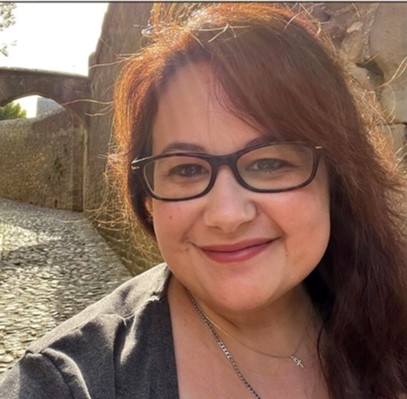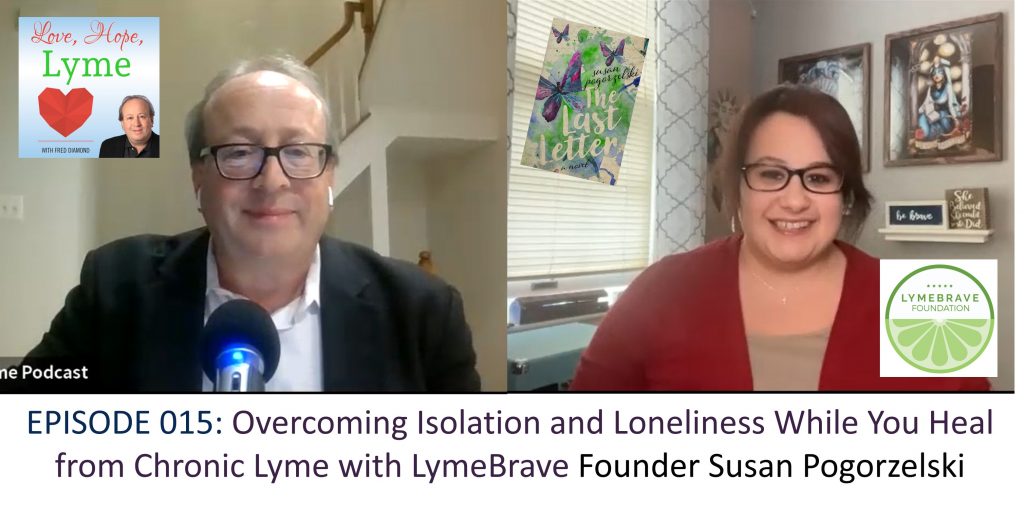PODCAST: Overcoming isolation and loneliness while you heal

By Fred Diamond
As I conducted the research for my book “Love, Hope, Lyme: What Family Members, Partners, and Friends Who Love a Chronic Lyme Survivor Need to Know,” many persistent Lyme survivors shared how isolated they felt while healing. Many told me they felt abandoned by family and friends.
On this week’s Love, Hope, Lyme podcast, Susan Pogorzelski, founder of the LymeBrave Foundation and author of “The Last Letter,” shared the struggles she felt while healing and what steps she took to overcome them. I’m sure many Lyme survivors can relate to what she went through.
“I had Lyme for 20 years before I was formally diagnosed,” she said. “I found on my journey that many people, me included, struggled with not just the physical toll that this illness creates but the emotional toll. The abandonment, isolation, and that feeling lonely, like you’re not heard or seen.”
To solve this, she founded the LymeBrave Foundation to develop educational resources for both survivors and caregivers with emphasis on the emotional toll. She also used her experience to write “The Last Letter,” a novel based on her experiences with Lyme disease. It’s a fictionalized version of her own experiences that follows a young girl who goes through her diagnosis and how it affects her family and loved ones around her as well.
Susan said, “I did not want anybody to suffer the way I had suffered. That’s the driving force behind why a lot of people create foundations such as LymeBrave. You don’t want anybody to experience what you have gone through.”
The importance of knowing you’re not alone

She said creating LymeBrave saved her life.
“My heart was failing, my brain was failing, and I was struggling. I was doing my own research, when I found an online support group with (people sharing) similar symptoms. That helped me find a diagnosis and ultimately get on my healing path. There is really something to be said for those support groups,” she said.
Advice for Caregivers
Susan said, “Nobody wants to experience the pain and the suffering that comes with this disease. To allow for that compassion and to not have that judgment and have the open mind can be supportive for the survivor.”
“They struggle with feelings of abandonment and feelings of isolation. They’re not the same person that they were prior to the illness,” she offered. “They’re fighting an invisible battle every single day. Compassion really is the key component here.”
Susan said she was diagnosed with everything from anxiety, depression, weight gain, through POTS. “I always said to myself, how is it that I have all these conditions and there’s not one root cause? It didn’t make logical sense for me and that’s why I kept doing research to get answers.”
“I was at my wit’s end. I had just gone to Johns Hopkins, and I had thought that it might be Lyme disease and I asked them for the testing, and they said no because they didn’t think I had Lyme disease. I said to my mother that I can’t do this anymore. I can’t fight, I give up.” She said, “I’m never going to give up, I’ll keep fighting for you.”
“The very next day, on one of the support groups, somebody gave me the name of a doctor. I called that doctor and I spoke for two hours on the phone with his wife who was the nurse practitioner. She verified even symptoms that I didn’t know were symptoms at the time, and verified everything I was experiencing. I felt like it was a miracle.”
Know that Your Loved One Might Change
She surmised, “Your entire life gets turned upside down by this illness. You’re not who you used to be, and you can’t go back. Whether that’s in your physical world, such as going back to a job or maintaining the stamina that you once had, or even emotionally. This disease can be traumatic in and of itself when you experience it because of the pain and the emotional suffering.”
She said that compassion is needed as their loved one is going through not just their physical healing journey, but the emotional healing journey. She advised caregivers to allow yourself to grow with them and be where they are. “Allow yourself to not just expect them to go right back once they’re healed or once they’re at a certain state in their functionality to go back to the life that they led,” she said.
“Give them allowance to have that experience that they’re experiencing and just holding that space and having that compassion for them and having that sense of connection and community,” she said. “It keeps coming back to compassion. Have that compassion and have that patience and just keep loving them as you always did but also give room for the illness and for the healing of that illness,” she advised.
“I always say this disease was a catalyst to me really becoming a better and stronger version of myself,” she said.
Learn more about LymeBrave here.
Click here to listen to all episodes of the Love, Hope, Lyme Podcast or on YouTube.
Fred Diamond is based in Fairfax, VA and can be contacted via Facebook. His popular book, “Love, Hope, Lyme: What Family Members, Partners, and Friends Who Love a Chronic Lyme Survivor Need to Know” is available on Amazon. The e-version of the book is always free to Lyme survivors. PM Fred on Facebook for your copy.




















We invite you to comment on our Facebook page.
Visit LymeDisease.org Facebook Page